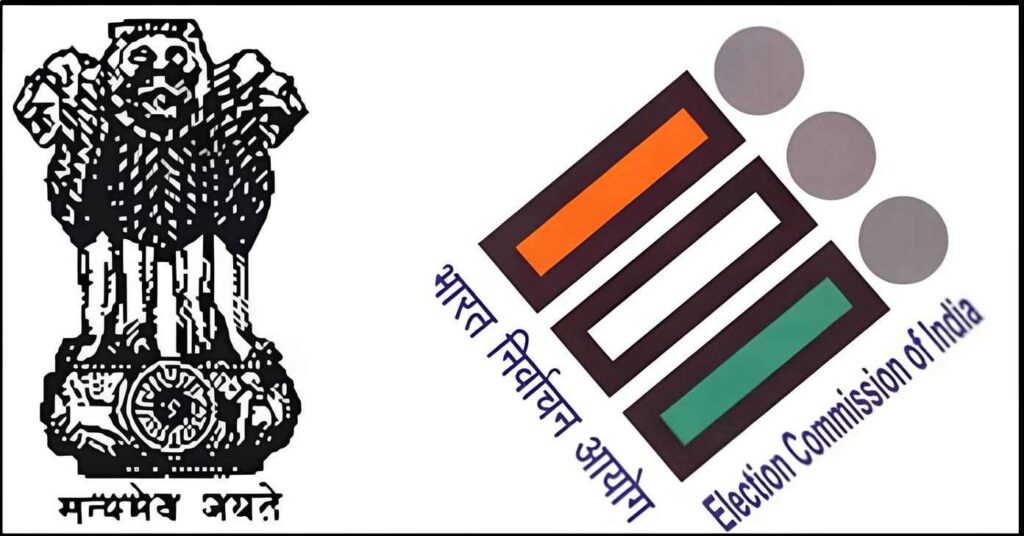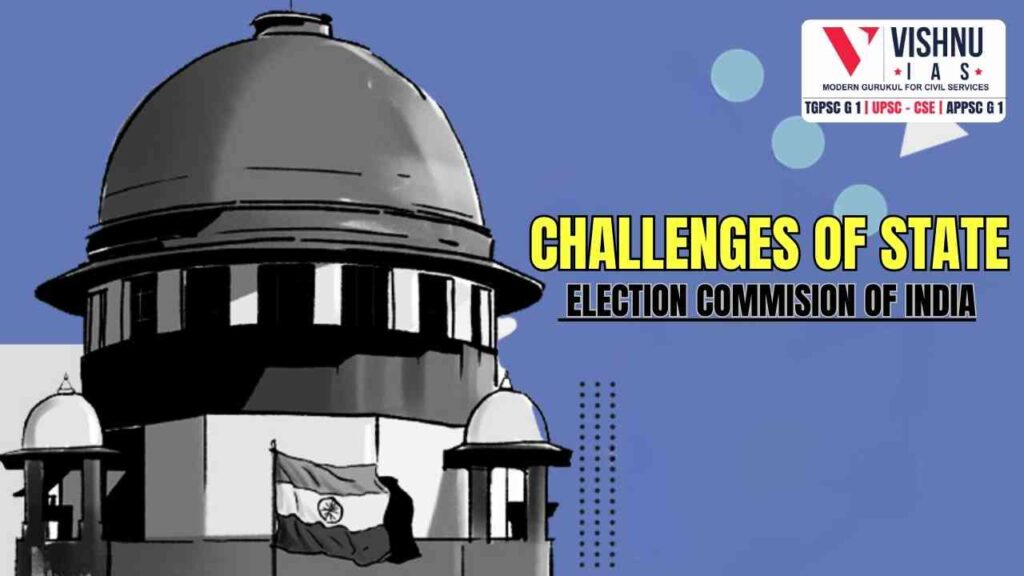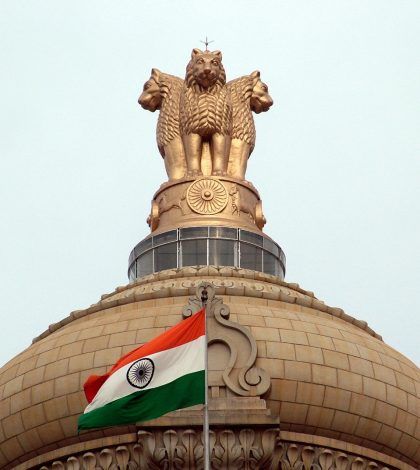CHALLENGES OF STATE ELECTION COMMISION OF INDIA
- The Election Commission of India (ECI) is widely recognized for its ability to conduct free, fair, and timely elections to the Parliament and State legislatures, making it one of India’s most credible institutions.
- However, the State Election Commissions (SECs), which are responsible for overseeing elections to Panchayats and Urban Local Governments (ULGs), face significant challenges in their operation.
- Established under Articles 243K and 243ZA of the Constitution through the 73rd and 74th Amendments in 1993, SECs were intended to ensure grassroots democracy. Yet, systemic issues have led to the disempowerment of SECs, raising concerns about their effectiveness and the need for comprehensive reforms.
SYSTEMIC ISSUES HINDERING THE EFFECTIVENESS OF SECS

Lack of Autonomy and Independence
- Issue: SECs often lack the autonomy necessary to function effectively, as their appointments and actions are heavily influenced by State governments. Unlike the ECI, which enjoys a high degree of independence, SECs are often subject to the whims of State governments.
- Example: The Karnataka SEC’s litigation against the Karnataka government for delaying Panchayat elections highlights the lack of independence. The SEC had to file a contempt petition when the government reneged on its commitment to the High Court, delaying elections by over three and a half years.
Inadequate Legal Framework
- Issue: The legal framework governing SECs is inadequate, leading to delays and inefficiencies in the electoral process. The absence of clear legal mandates for crucial functions like ward delimitation and reservation of seats exacerbates these issues.
- Case Study: In 2020, the Andhra Pradesh SEC faced legal hurdles when the State government issued an ordinance that hindered elections to Panchayat Raj institutions. The Supreme Court struck down this ordinance, emphasizing the need for a robust legal framework for SECs.
Underutilization of Powers
- Issue: Even though SECs are constitutionally empowered to conduct local elections, they often do not exercise their full powers due to interference from State governments. This underutilization leads to delays and undermines the effectiveness of local governance.
- Example: The Comptroller and Auditor General’s (CAG) audit revealed that 70% of Urban Local Governments (ULGs) across 18 states did not have elected councils at the time of the audit, primarily due to the disempowerment of SECs.
Arbitrary Delimitation and Reservation
- Issue: The lack of fixed intervals for delimitation of ward boundaries and reservations of seats allows State governments to act arbitrarily, leading to undue delays in elections.
- Case Study: Janaagraha’s Annual Survey of India’s City Systems (ASICS) 2023 found that only 11 out of 34 States and Union Territories had empowered SECs to conduct ward delimitation, affecting only 35% of India’s population.
Inadequate Financial and Human Resources
- Issue: SECs often operate with limited financial and human resources, restricting their ability to conduct elections efficiently. This lack of resources also hinders their capacity to implement modern electoral practices and technologies.
- Example: The Karnataka SEC’s struggle to conduct timely elections due to inadequate resources is a reflection of the broader resource challenges faced by SECs across the country.
Political Interference
- Issue: SECs frequently face political interference, which compromises their ability to conduct free and fair elections. This interference can take the form of undue pressure to delay elections or manipulate electoral processes.
- Case Study: The Chandigarh Municipal Corporation’s 2024 mayoral election witnessed malpractice by presiding officers appointed by the State government, highlighting the risks of political interference in SEC operations.
Erosion of Public Trust
- Issue: The systemic delays and inefficiencies in conducting local elections erode public trust in local governance institutions. This erosion of trust undermines the democratic process at the grassroots level.
- Survey: The CAG’s Karnataka report observed that the disempowerment of SECs is often the cause of delays in elections, which in turn erodes citizens’ trust in local government institutions.
REFORMS TO STRENGTHEN THE CAPACITY AND AUTONOMY OF SECS

Constitutional and Legislative Amendments
- Proposal: Amend the 74th Constitutional Amendment to provide SECs with the same level of independence as the ECI. This includes ensuring that SECs are constituted and appointed by an independent committee comprising the Chief Minister, Leader of Opposition in the Legislative Assembly, and the Chief Justice of the High Court.
- Example: The Supreme Court in Kishan Singh Tomar vs Municipal Corporation of Ahmedabad (2006) observed the need to empower SECs on par with the ECI to ensure free and fair local elections.
Constitutional and Legislative Amendments
- Proposal: Amend the 74th Constitutional Amendment to provide SECs with the same level of independence as the ECI. This includes ensuring that SECs are constituted and appointed by an independent committee comprising the Chief Minister, Leader of Opposition in the Legislative Assembly, and the Chief Justice of the High Court.
- Example: The Supreme Court in Kishan Singh Tomar vs Municipal Corporation of Ahmedabad (2006) observed the need to empower SECs on par with the ECI to ensure free and fair local elections.
Fixed Delimitation and Reservation Intervals
- Proposal: Mandate that delimitation of ward boundaries and reservation of seats be conducted at fixed intervals, such as every 10 years, to prevent arbitrary actions by State governments.
- Case Study: The introduction of fixed intervals for delimitation and reservations would prevent undue delays, as seen in the Karnataka case where delayed delimitation hindered the election process.
Enhanced Financial and Human Resources
- Proposal: Increase the allocation of financial and human resources to SECs to enable them to conduct elections more efficiently. This includes investing in modern electoral technologies and training for SEC staff.
- Example: Increased resources would enable SECs to avoid delays like those observed in the CAG’s audit, where under-resourced SECs were unable to conduct timely elections.
Empowerment of SECs in Electoral Processes
- Proposal: Vest SECs with the power to conduct all aspects of local elections, including ward delimitation, reservation of seats, and elections for mayors and other key local government positions.
- Case Study: Empowering SECs to oversee these processes would prevent delays like those in Chandigarh’s 2024 mayoral election, where State government interference compromised the election’s integrity.
Strengthening Legal Recourse for SECs
- Proposal: Establish clear legal recourse mechanisms for SECs to challenge undue interference by State governments. This would include fast-tracking legal cases related to SEC autonomy.
- Example: The Karnataka SEC’s litigation against the State government would be streamlined under a strengthened legal framework, allowing for quicker resolutions and fewer delays in the electoral process.
Public Awareness and Civic Education
- Proposal: Increase public awareness about the role and importance of SECs in the democratic process through civic education campaigns. This would help build public support for SEC autonomy.
- Survey: Public support for stronger SECs, as reflected in civic engagement surveys, would help counteract political interference and ensure more robust local governance.
Monitoring and Evaluation Mechanisms
- Proposal: Implement regular monitoring and evaluation mechanisms to assess the performance of SECs and ensure they are adhering to constitutional mandates. These evaluations should be conducted by independent bodies.
- Example: Regular evaluations would help identify and address issues like those found in the CAG’s audit, ensuring that SECs are held accountable and continuously improving their operations.
Conclusion
- The challenges faced by State Election Commissions in India are multifaceted and stem from systemic disempowerment, political interference, and inadequate resources. To ensure robust and effective grassroots democracy, it is imperative to strengthen the capacity and autonomy of SECs through constitutional amendments, enhanced resources, and legal safeguards.
- By aligning SECs with the standards of the Election Commission of India, we can uphold the sanctity of local governance and restore public trust in these crucial democratic institutions.
- As India continues to evolve, empowering SECs will be essential for ensuring that local governments can effectively serve their communities and contribute to the nation’s democratic fabric.


